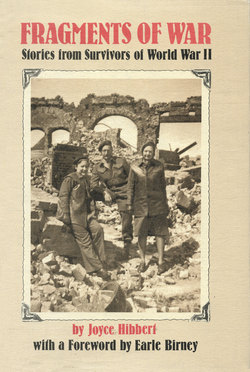Читать книгу Fragments of War - Joyce Hibbert - Страница 16
На сайте Литреса книга снята с продажи.
Оглавление6
Acceptance
Outside Greyshott, England, in September 1941, Canadian Army Chaplain Waldo Smith studied his map before his rounds. Recently in 1980 Waldo Smith had this comment on one consequence of the Second World War.
“My personal jeep had been ‘modified’ to serve as an ambulance if necessary. The ordnance section built a projection in the rear to support angle irons which would be the tracks to take stretchers. I had a canvas cover with a large red cross painted on each side. When the enemy saw this symbol they did not shoot at me.
For a girl to marry a serviceman from overseas was a high risk gamble. She was too willing to believe the best of men who set themselves out to please. And in war’s hazards the uniform did something to women. Many a man looked smart only because the provost sergeant had not let him out otherwise.”
Close to 50,000 young women, the majority from Britain and Holland, took that gamble and married Canadian servicemen. For most of them, it was a happy choice.
Reverend W.E.L. Smith relayed the following poignant story connected with one such venture.
“A farm, a few miles north of Cobourg, Ontario was the destination of an English war bride and her infant son. Her husband, a farmer’s son had arrived home ahead of her and was working with his father.
“Unfortunately, the mother bitterly resented the marriage and received the daughter-in-law unkindly. The poor girl had an unhappy time that winter. In spring she went into hospital for the birth of a second child.
“Grandmother was left in charge of the little boy, by then a toddler. One day she suddenly noticed that he was no longer with her. She hurried outside to look for and call him, but could find no trace. During the lapse of supervision he had found his way to a pond and drowned.
“The young war bride was told of the tragedy and prepared herself for the return to her husband’s home. Carrying the newborn child she went into the farmhouse and greeted her mother-in-law with a warm smile. The older woman broke down, all bitterness gone.”
Honourary Major Waldo E. L. Smith M.C. served overseas 1941-45 as chaplain with the 1st Canadian Armoured Brigade, the Canadian Army Service Corps and later with infantry as they attacked the Gothic Line. His book, What Time The Tempest, an account of his wartime experiences, was published by Ryerson Press in 1952. Rev W.E.L. Smith is a retired minister of the United Church living in Kingston, Ontario.
